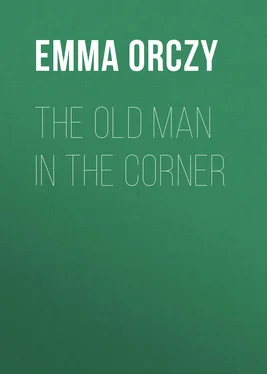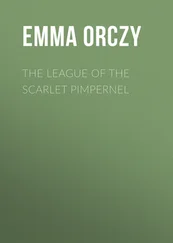Emma Orczy - The Old Man in the Corner
Здесь есть возможность читать онлайн «Emma Orczy - The Old Man in the Corner» — ознакомительный отрывок электронной книги совершенно бесплатно, а после прочтения отрывка купить полную версию. В некоторых случаях можно слушать аудио, скачать через торрент в формате fb2 и присутствует краткое содержание. Жанр: foreign_prose, Классический детектив, foreign_detective, foreign_antique, на английском языке. Описание произведения, (предисловие) а так же отзывы посетителей доступны на портале библиотеки ЛибКат.
- Название:The Old Man in the Corner
- Автор:
- Жанр:
- Год:неизвестен
- ISBN:нет данных
- Рейтинг книги:5 / 5. Голосов: 1
-
Избранное:Добавить в избранное
- Отзывы:
-
Ваша оценка:
- 100
- 1
- 2
- 3
- 4
- 5
The Old Man in the Corner: краткое содержание, описание и аннотация
Предлагаем к чтению аннотацию, описание, краткое содержание или предисловие (зависит от того, что написал сам автор книги «The Old Man in the Corner»). Если вы не нашли необходимую информацию о книге — напишите в комментариях, мы постараемся отыскать её.
The Old Man in the Corner — читать онлайн ознакомительный отрывок
Ниже представлен текст книги, разбитый по страницам. Система сохранения места последней прочитанной страницы, позволяет с удобством читать онлайн бесплатно книгу «The Old Man in the Corner», без необходимости каждый раз заново искать на чём Вы остановились. Поставьте закладку, и сможете в любой момент перейти на страницу, на которой закончили чтение.
Интервал:
Закладка:
"The stables, which immediately faced the back entrance of the Phillimore Terrace houses, were all private ones belonging to residents in the neighbourhood. The coachmen, their families, and all the grooms who slept in the stablings were rigidly watched and questioned. One and all had seen nothing, heard nothing, until Robertson's shrieks had roused them from their sleep.
"As for the letter from Brighton, it was absolutely commonplace, and written upon note-paper which the detective, with Machiavellian cunning, traced to a stationer's shop in West Street. But the trade at that particular shop was a very brisk one; scores of people had bought note-paper there, similar to that on which the supposed doctor had written his tricky letter. The handwriting was cramped, perhaps a disguised one; in any case, except under very exceptional circumstances, it could afford no clue to the identity of the thief. Needless to say, the tramp, when told to write his name, wrote a totally different and absolutely uneducated hand.
"Matters stood, however, in the same persistently mysterious state when a small discovery was made, which suggested to Mr. Francis Howard an idea, which, if properly carried out, would, he hoped, inevitably bring the cunning burglar safely within the grasp of the police.
"That was the discovery of a few of Mr. Knopf's diamonds," continued the man in the corner after a slight pause, "evidently trampled into the ground by the thief whilst making his hurried exit through the garden of No. 22, Phillimore Terrace.
"At the end of this garden there is a small studio which had been built by a former owner of the house, and behind it a small piece of waste ground about seven feet square which had once been a rockery, and is still filled with large loose stones, in the shadow of which earwigs and woodlice innumerable have made a happy hunting ground.
"It was Robertson who, two days after the robbery, having need of a large stone, for some household purpose or other, dislodged one from that piece of waste ground, and found a few shining pebbles beneath it. Mr. Knopf took them round to the police-station himself immediately, and identified the stones as some of his Parisian ones.
"Later on the detective went to view the place where the find had been made, and there conceived the plan upon which he built big cherished hopes.
"Acting upon the advice of Mr. Francis Howard, the police decided to let the anonymous tramp out of his safe retreat within the station, and to allow him to wander whithersoever he chose. A good idea, perhaps—the presumption being that, sooner or later, if the man was in any way mixed up with the cunning thieves, he would either rejoin his comrades or even lead the police to where the remnant of his hoard lay hidden; needless to say, his footsteps were to be literally dogged.
"The wretched tramp, on his discharge, wandered out of the yard, wrapping his thin coat round his shoulders, for it was a bitterly cold afternoon. He began operations by turning into the Town Hall Tavern for a good feed and a copious drink. Mr. Francis Howard noted that he seemed to eye every passer-by with suspicion, but he seemed to enjoy his dinner, and sat some time over his bottle of wine.
"It was close upon four o'clock when he left the tavern, and then began for the indefatigable Mr. Howard one of the most wearisome and uninteresting chases, through the mazes of the London streets, he ever remembers to have made. Up Notting Hill, down the slums of Notting Dale, along the High Street, beyond Hammersmith, and through Shepherd's Bush did that anonymous tramp lead the unfortunate detective, never hurrying himself, stopping every now and then at a public-house to get a drink, whither Mr. Howard did not always care to follow him.
"In spite of his fatigue, Mr. Francis Howard's hopes rose with every half-hour of this weary tramp. The man was obviously striving to kill time; he seemed to feel no weariness, but walked on and on, perhaps suspecting that he was being followed.
"At last, with a beating heart, though half perished with cold, and with terribly sore feet, the detective began to realize that the tramp was gradually working his way back towards Kensington. It was then close upon eleven o'clock at night; once or twice the man had walked up and down the High Street, from St. Paul's School to Derry and Toms' shops and back again, he had looked down one or two of the side streets and—at last—he turned into Phillimore Terrace. He seemed in no hurry, he oven stopped once in the middle of the road, trying to light a pipe, which, as there was a high east wind, took him some considerable time. Then he leisurely sauntered down the street, and turned into Adam and Eve Mews, with Mr. Francis Howard now close at his heels.
"Acting upon the detective's instructions, there were several men in plain clothes ready to his call in the immediate neighbourhood. Two stood within the shadow of the steps of the Congregational Church at the corner of the mews, others were stationed well within a soft call.
"Hardly, therefore, had the hare turned into the cul-de-sac at the back of Phillimore Terrace than, at a slight sound from Mr. Francis Howard, every egress was barred to him, and he was caught like a rat in a trap.
"As soon as the tramp had advanced some thirty yards or so (the whole length of this part of the mews is about one hundred yards) and was lost in the shadow, Mr. Francis Howard directed four or five of his men to proceed cautiously up the mews, whilst the same number were to form a line all along the front of Phillimore Terrace between the mews and the High Street.
"Remember, the back-garden walls threw long and dense shadows, but the silhouette of the man would be clearly outlined if he made any attempt at climbing over them. Mr. Howard felt quite sure that the thief was bent on recovering the stolen goods, which, no doubt, he had hidden in the rear of one of the houses. He would be caught in flagrante delicto , and, with a heavy sentence hovering over him, he would probably be induced to name his accomplice. Mr. Francis Howard was thoroughly enjoying himself.
"The minutes sped on; absolute silence, in spite of the presence of so many men, reigned in the dark and deserted mews.
"Of course, this night's adventure was never allowed to get into the papers," added the man in the corner with his mild smile. "Had the plan been successful, we should have heard all about it, with a long eulogistic article as to the astuteness of our police; but as it was—well, the tramp sauntered up the mews—and—there he remained for aught Mr. Francis Howard or the other constables could ever explain. The earth or the shadows swallowed him up. No one saw him climb one of the garden walls, no one heard him break open a door; he had retreated within the shadow of the garden walls, and was seen or heard of no more."
"One of the servants in the Phillimore Terrace houses must have belonged to the gang," said Polly with quick decision.
"Ah, yes! but which?" said the man in the corner, making a beautiful knot in his bit of string. "I can assure you that the police left not a stone unturned once more to catch sight of that tramp whom they had had in custody for two days, but not a trace of him could they find, nor of the diamonds, from that day to this."
CHAPTER VI
ALL HE KNEW
"The tramp was missing," continued the man in the corner, "and Mr. Francis Howard tried to find the missing tramp. Going round to the front, and seeing the lights at No. 26 still in, he called upon Mr. Shipman. The jeweller had had a few friends to dinner, and was giving them whiskies-and-sodas before saying good night. The servants had just finished washing up, and were waiting to go to bed; neither they nor Mr. Shipman nor his guests had seen or heard anything of the suspicious individual.
Читать дальшеИнтервал:
Закладка:
Похожие книги на «The Old Man in the Corner»
Представляем Вашему вниманию похожие книги на «The Old Man in the Corner» списком для выбора. Мы отобрали схожую по названию и смыслу литературу в надежде предоставить читателям больше вариантов отыскать новые, интересные, ещё непрочитанные произведения.
Обсуждение, отзывы о книге «The Old Man in the Corner» и просто собственные мнения читателей. Оставьте ваши комментарии, напишите, что Вы думаете о произведении, его смысле или главных героях. Укажите что конкретно понравилось, а что нет, и почему Вы так считаете.












